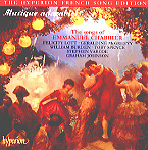The composer of orchestral showpieces such as Espana and wonderful comic operas like L’Étoile and Le Roi malgré lui often is devalued because of his supposed lack of seriousness. Chabrier’s songs are rarely heard, and while this superbly-produced set of his complete melodies should be welcomed by all, I doubt it will change many opinions. Those who like Chabrier’s music will welcome the opportunity to hear all of his 43 songs; those who don’t, won’t. The in-betweeners will wish the best of the bunch had been collected on a single disc. But all must admire production values that include Graham Johnson’s comprehensive book-length notes, which contain full texts and translations and comprehensive analyses of each song.
As in any “complete” undertaking, there are some middling songs from a young composer learning his trade. But even these include some that continue to delight, such as “Ah! petit demon”, which, like much of his work, skirts the fine line between art song and cabaret. “Ivresses!” is another such, virtually a compilation of waltz themes with an infectious lilt that belies their innate banality. Its last stanza is a semi-hysterical cry for wine, the “divine assistance” to rapture. Felicity Lott is delicious here, really getting into the spirit of Chabrier’s inspired lunacy.
Chabrier anticipated one of his later admirers, Poulenc, by composing a set of songs about animals, full of his special kind of ironic wit. It may not hit the laugh button these days, but his bestiary is amusing–and some songs, such as “Les Cigales”, have beguiling zest and memorable melodies. The best of Chabrier’s songs are very good indeed and there’s no denying his originality. “L’ile heureuse” is pervaded by an intoxicating sensuality, a quality shared more obliquely by the extravagant “Toutes les fleurs”, which also has its share of subtle parody, and the surprising sonorities of a solo bassoon lend a captivating touch to “L’Invitation au voyage”, which has taken a backseat to Duparc’s more subtle version of the poem. Sixteen folksong arrangements are variable but fetching at their best, and there’s a funny duet between an usherette and a department store employee celebrating their good fortune at being pensioned off. The final Ode to Music for soprano and female chorus is atypical but deeply felt.
The performances are good, but you can imagine better, preferably by French singers (if any exist) who can capture Chabrier’s elusive idiom. But these English singers (and one American) come close enough. Lott sings most of the songs, and while she has the brio and thrust of Chabrier’s style down pat, her voice is harder and less flexible than it once was. The others are serviceable rather than compelling, and Johnson’s piano accompaniments, like his written notes, are right on target.
































